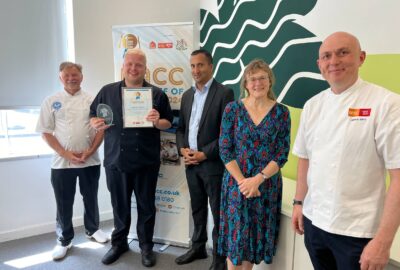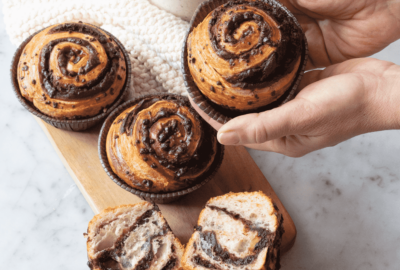TV chef Phil Vickery has worked on This Morning for over 15 years and met his wife – presenter Fern Britton – in the process. He started his career as a commis chef at the Burlington Hotel in Folkestone and worked his way up the kitchen ranks, winning numerous awards, including a Michelin star, along the way. He has written 15 books and is the National Food Ambassador for Coeliac UK (www.coeliac.org.uk).
You are a leading authority on gluten-free cooking. How and why did you become involved in this area of the food industry? It all came about because we could not get organic wheat flour at a reasonable price when I had a Christmas pudding company a few years ago. The response to the fact the puddings were glutenfree was staggering, I then contacted Coeliac UK for advice, the rest is history…
What advice can you offer professional chefs with regard to gluten-free cooking/ baking? Give it some thought – but don’t over-think it! You’ve got to understand what gluten-free means but chefs do tend to over-think things.
Has the new food allergy legislation made life easier or more difficult for professional chefs? Personally I think it’s fantastic, the best thing that ever happened to the industry. The good thing is that you have to embrace it. Lifestyles and diets have changed and there are a lot more allergens identified and the new legislation has helped chefs be more responsible and has given people a kick up the backside and forced them to look at it.
Who has had the most influence over your career and what is the most valuable piece of advice you have been given? A chef called Frank Barnes said to me in 1979: “If you only make a burger, make sure they’re the best in the world” and I apply that to everything I do. Raymond Blanc was a big influence in the early 1980s and everyone wanted to work with him. He was the most creative chef we have ever had in England and we had never seen anything like him.
You had to be persuaded to become a TV chef (citing that you were not interested because you were a “real chef”). Are you glad you changed your mind? Yes I am! Ready Steady Cook came back to me again three months after first asking me to see if I would re-consider. I just happened to be going to London the next day so I agreed to go along. Fern (Phil’s wife) was the compere. When I first started doing TV it was really frowned upon by other chefs, like you were whoring yourself around. Nowadays you have to get on TV to get a book deal. It has come full circle. It catapults you into a different league.
Fifteen years is a pretty long stint on the same TV show (‘This Morning’). What keeps you going back for more – and how do you keep things ‘fresh’? I just love it! They give me no hassle and send me on lovely trips around the world. They give me free rein and keeping it fresh isn’t a problem. I read six newspapers at the weekend and buy all the latest food books to keep me up to speed with everything – but I don’t watch cookery programmes on TV. How important was gaining a Michelin star to you? In those days – the early 90s – it was very important and there were only 35 of us in the country. If you didn’t have any stars, people thought you were just another chef. I was very proud, I remember the day when the boss told me. I went home and walked the dog and felt really low. I remember thinking ‘What am I going to do now?’ and ‘Oh my God, I’ve got to keep it now!’
You’re a prolific tweeter! Is social media a necessity for chefs? I hated it! Philip Schofield kept telling me I need to get on Twitter – and I said ‘You need to get out more mate!’ In the end I have had to do it because of various contracts I have had. I don’t take it too seriously but I admit it is a great way of connecting with people that you might not otherwise meet.
If you could re-live you career, what would you do differently and why? I wouldn’t be a chef – I would be a farmer. I lost my first marriage and a lot of friends through being a chef. I spent a big chunk of my life from 1989-99 in an underground kitchen and whole seasons would pass me by. I went to work in the dark and came home in the dark and I didn’t see the days. I didn’t want to end up a grey, burnt-out hermit.
Tell us about your foray into pig farming. Peter Gott – the “god of pig farming” – and myself went to Iberico and Palma in southern Spain to make a film about how they make air-dried ham. Miguel, the farmer who we met there, told me we couldn’t do it in the UK but, on the plane home, I thought to myself ‘We’ve got the land, the pigs and we can mimic the acorns, why can’t we do it?’. I get immense enjoyment from it.
How do you relax? I like watching football (I’m a Spurs fan). I also take 12 weeks holiday. I have the whole of August off, two weeks at Christmas, two weeks at Easter and I do a four-day week. I have worked bloody hard and am now at the stage that I can pick and choose what I do. My dad retired at 56 and he’s now 81.
And now for three questions that we ask all of our Leading Lights…
What are your three kitchen secrets?
1. Don’t work too hard: Chefs try too hard and work unnecessary hours because they are obsessed with food. I applaud Sat Bains for doing a four-day week and proving it can be done.
2. Read, read, read. It’s the best thing a young chef can do.
3. Eat your own food, not just taste it. Eat the whole thing.
What is your favourite ingredient and why? Onions. I can’t live without them.
Please could you share your favourite recipe, along with your reasons for choosing it? My gluten-free polenta tray bake with a tangy lemon and raspberry fondant. It’s probably one of the first gluten-free things I developed and, having had lots of things go wrong, it worked and tasted really nice.
Gluten-free polenta tray bake with a tangy lemon and raspberry fondant
Makes 25 portions
TIP Add half of the raspberry juice to t he fondant to make a pink icing
Ingredients 175g margarine 225g caster sugar 3 eggs 250g polenta (raw) 3g xanthan gum 10ml vanilla extract 10g lemon zest 15g gluten-free baking powder 250g raspberries 250g icing sugar 40ml lime juice
Method
1. Pre heat the oven to 180°C or gas mark 4. Lightly grease a 26cm x 20cm tin.
2. Lightly cream the Stork and the caster sugar together, add the eggs, baking powder, lemon zest, vanilla extract and polenta then mix well.
3. Add half the raspberries and carefully fold in. Pour the whole mixture into a greased tin and bake until well risen, approx. 20 minutes.
4. Remove from the oven and allow to cool.
5. Mix the lime juice and the icing sugar until you have the consistency of very thick cream.
6. Spoon half the icing over the sponge then place on the remaining raspberries. Drizzle over the remaining icing sugar and leave to set at room temperature.



